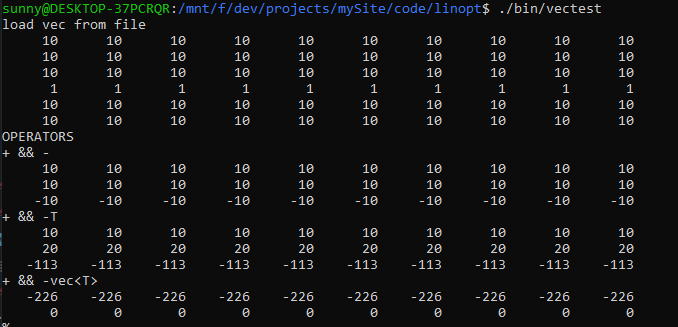Project Overview

LinOpt is a comprehensive C++ library designed for solving linear optimization problems and performing polyhedral computations with high precision and performance.
The project provides a complete toolkit for:
- Linear Programming: Simplex algorithm implementation with two-phase optimization
- Matrix Operations: High-performance matrix and vector computations with arbitrary precision
- Polyhedral Geometry: Integration with LRS library for vertex enumeration and facet computation
- Numerical Precision: Support for both floating-point and rational arithmetic using GMP
Key Innovation
What makes this project particularly interesting is its seamless integration of modern C++ templates with the venerable LRS (lrslib) library, providing both high-level abstractions and low-level performance for computational geometry and optimization problems.
System Architecture
LinOpt employs a layered architecture that combines template-based C++ abstractions with high-performance numerical libraries.
Core Components
| Component | Purpose | Key Features |
|---|---|---|
mat<T> |
Matrix operations and linear algebra | Determinant, inverse, row operations, LRS integration |
vec<T> |
Vector operations and storage | Element-wise operations, slicing, concatenation |
optim<T> |
Linear programming solver | Two-phase simplex, pivot operations, tableau management |
polytope<T> |
Polyhedral geometry computations | Vertex enumeration, facet computation, H-representation |
kvp<T> |
Key-value pair storage | Associative data structures for optimization |
Design Patterns
- Template Metaprogramming: Generic programming for type-safe numerical computations
- RAII: Resource management through constructors and destructors
- Operator Overloading: Intuitive mathematical syntax for matrix/vector operations
- External Library Integration: Seamless C interface to LRS and GMP libraries
Key Features
1. Linear Programming Solver
Comprehensive implementation of the simplex algorithm:
- Two-Phase Optimization: Automatic handling of infeasible starting points
- Mixed Constraints: Support for both ≤ and ≥ inequality constraints
- Artificial Variables: Automatic introduction and elimination of artificial variables
- Pivot Operations: Efficient tableau updates and basis management
2. High-Performance Matrix Operations
Optimized matrix and vector computations:
- Arbitrary Precision: Support for both double and GMP rational arithmetic
- Memory Efficiency: 1D array storage with optimized access patterns
- Linear Algebra: Determinant, inverse, eigenvalue computations
- Row Operations: Elementary row operations for matrix manipulation
3. Polyhedral Geometry Integration
Advanced computational geometry capabilities:
- LRS Integration: Direct interface to lrslib for vertex enumeration
- H-Representation: Support for half-space representations of polytopes
- V-Representation: Vertex-based polyhedral descriptions
- Dual Descriptions: Conversion between different polyhedral representations
4. Numerical Precision and Stability
Robust numerical computations:
- GMP Integration: Arbitrary-precision arithmetic for exact computations
- Floating-Point Control: Configurable tolerance and precision settings
- Numerical Stability: Careful handling of near-zero values and degeneracy
- Error Handling: Comprehensive error checking and validation
Usage Examples
Basic Setup
# Find required packages
find_package(GMP REQUIRED)
# Include directories
include_directories(
${CMAKE_SOURCE_DIR}/src
${CMAKE_SOURCE_DIR}/lrslib-071
)
# Link libraries
target_link_libraries(myapp linopt lrs GMP::GMP)Linear Programming Example
// Define constraint matrix H and objective vector c
mat<double> H(2, 3);
H(0, 0, 1); H(0, 1, -1); H(0, 2, 0);
H(1, 0, 1); H(1, 1, 0); H(1, 2, -1);
vec<double> c(H.size_x);
c.set(0, 0); c.set(1, -1); c.set(2, -1);
// Create optimizer and solve
optim<double> o(H, c);
vec<double> solution = (o.simplex()).trunc(0, H.size_x-1);Matrix Operations
// Create and manipulate matrices
mat<double> A(3, 3);
A.identity(); // Create identity matrix
// Matrix operations
mat<double> B = A.transpose();
double det = A.det(); // Compute determinant
// Row and column operations
A.row_swap(0, 1);
A.row_add(0, 1, 2.0);Technical Implementation
Technology Stack
LinOpt is built using modern C++ with integration to established numerical libraries:
- C++17: Modern C++ features for template metaprogramming and type safety
- GMP (GNU Multiple Precision): Arbitrary-precision arithmetic library
- LRS (lrslib): Library for reverse search vertex enumeration
- CMake: Cross-platform build system configuration
Performance Optimizations
| Optimization | Implementation | Benefit |
|---|---|---|
| Memory Layout | 1D array storage with column-major ordering | Improved cache locality and memory access patterns |
| Template Specialization | Optimized implementations for common data types | Reduced runtime overhead and better compiler optimization |
| LRS Integration | Direct C interface to lrslib without wrapper overhead | Maximum performance for polyhedral computations |
| Compile-time Configuration | Configurable precision and tolerance via preprocessor | Flexible trade-offs between speed and accuracy |
Dependencies
- GMP 6.0+: GNU Multiple Precision Arithmetic Library for exact computations
- LRS 7.1: Library for reverse search vertex enumeration algorithms
- CMake 3.16+: Build system for cross-platform compilation
- C++17 Compiler: GCC 7+, Clang 5+, or MSVC 2017+
Build Configuration
# Compiler flags for different build types
CMAKE_CXX_FLAGS_DEBUG = "-g -O0 -Wall -Wextra -DDEBUG"
CMAKE_CXX_FLAGS_RELEASE = "-O3 -DNDEBUG -DLRS_QUIET"
# Key preprocessor definitions
-DTOL 0.000000000000001 # Tolerance for zero comparisons
-DFUDGE 0.001 # Equality constraint fudging
-DMAXITER 100000 # Maximum simplex iterations
-DUSE_OUTPUT_FILE # Enable file output in driversTesting Framework
Comprehensive unit testing ensures reliability:
- Vector Tests: Element-wise operations, slicing, and concatenation
- Matrix Tests: Linear algebra operations, determinant, and inverse
- KVP Tests: Key-value pair storage and retrieval
- Optimization Tests: Linear programming solver validation